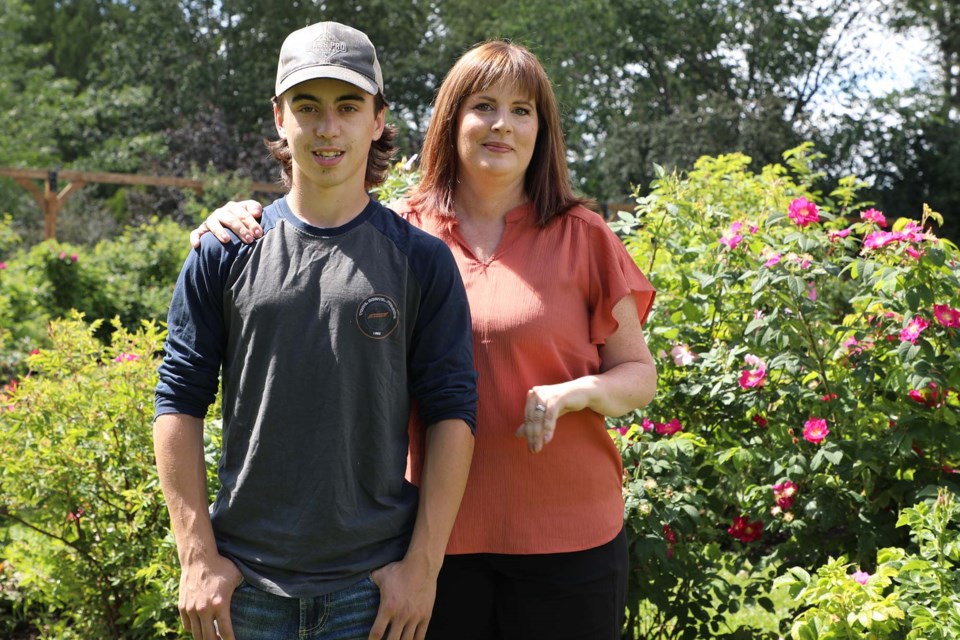Carter LaFramboise’s baseline cough has disappeared since he started a newly expanded treatment for cystic fibrosis (CF) back in December.
“Carter would cough quite regularly and be a little gunky sounding, and now he has nothing. His lung function has improved. His growth has improved, and he has no cough,” said Kim LaFramboise, mother to the 16 year old.
On July 11, the province announced they would be expanding access to the cystic fibrosis drug Trikafta to include children aged six-11.
CF is a genetic disease that causes mucus to build up in organs such as the lungs and pancreas. Those who have CF may have persistent cough, shortness of breath, frequent chest infections, and weight loss.
The treatment, which is a triple combination therapy, works on the underlying causes of CF and may prevent irreversible damage of the disease by correcting the malfunctioning protein made by the cystic fibrosis transmembrane conductance regulator (CFTR) gene. This gene regulates the flow of water and chloride in the cells lining the lungs and other organs, states the Cystic Fibrosis Canada website.
Health Canada approved the use of Trikafta for anyone living with cystic fibrosis over the age of six, with one copy of the F508del mutation, regardless of their second mutation, the website reads.
Alberta Health Minister Jason Copping said clinical trials of the treatment have demonstrated clinically meaningful improvements in lung function, nutritional status, and health-related quality of life.
“While today there is no cure for cystic fibrosis, great progress continues to be made in drug treatments to slow the disease,” he said.
Health Canada approved the treatment for children aged six-11 on April 19. On July 6, Trikafta was recommended for listing by the Canadian Agency for Drugs and Technologies in Health, with Alberta expanding eligibility shortly after.
Babies who have CF may experience a blocked small intestine, breathing problems, not growing nor gaining weight even with a good appetite, salty skin, and diarrhea.
Kim Steele, director of government and community relations at Cystic Fibrosis Canada said she is pleased with Alberta’s decision to expand Trikafta treatment to include six to 11-year-olds, saying it is a move that will change the face of cystic fibrosis in the province.
Steele said the treatment is considered the greatest innovation in the history of CF, and can treat up to 90 per cent of Canadians with cystic fibrosis.
“(Trikafta) addresses the underlying causes of the disease instead of just managing the symptoms, potentially preventing irreversible damage caused by progressive disease,” she said. “This is a day that our community has fought long and hard for … this will change the trajectory of the disease, and the future, for many children in Alberta who live with cystic fibrosis.”
There are approximately 547 Albertans who live with cystic fibrosis, according to the Canadian Cystic Fibrosis Registry, and around 405 of those people could benefit from treatment with Trikafta.
According to the registry, there are 66 of these children between the ages of six and 11 years old that could benefit from this treatment.
The LaFramboise’s had been following news on Trikafta to see how it did in the United States, before it was approved for those age 12 and up in Canada last September.
Kim knew Carter would be approved because of his gene type.
There wasn’t much the LaFamboise’s had to do for Carter to receive the treatment besides test to find out the baseline of his health beforehand, Kim said.
Carter began the treatment on Dec. 23.
“He just recently had what's called a sweat-chloride test (a marker for cystic fibrosis) and now he's back down in the normal range," Kim said.
“It almost feels like he doesn't have CF right now. He's been very healthy. We're just enjoying a little bit of security, I guess, as far as his health."
However, because there isn’t much research on what will happen with Trikafta long term, Carter still does his regular treatments to manage his CF in addition to taking the drug. These include inhalers, a PEP device to strengthen his lungs, and antibiotics.
Kim said the treatment has given people who are living with cystic fibrosis hope for a longer and healthier future.
When asked about what it means for families who have young children with CF who qualify for the treatment, Kim gets emotional
“It's exciting. It will take a lot of weight off (families’) shoulders. Their children will be a lot healthier growing up right from the beginning, and it'll be a huge benefit.”


